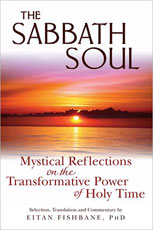"On the day of rest we are liberated from our enslavement to multitasking, from all of the electronic communication that pervades the six days of work. Unplugged from the world of commerce and the forms of connection that keep us at a remove from the living voice of the other, we are released into a zone of quiet and reflection — a time in which the calm of solitude can find perfect balance with the community and relationship of Sabbath life." So writes Eitan Fishbane, a frequent scholar-in-residence and guest speaker at congregations across America. He is also assistant professor of Jewish thought at the Jewish Theological Seminary in New York.
The spiritual transformations that come with the Sabbath also include the healing balm of stillness and rest of the body and mind. Fishbane continues: "It is a time that whispers of mystery and redemption, a corridor within the hours that transports us to a new level of feeling and thought." The sages of the past saw the Sabbath as a hint of the world to come and a "melody that sings at the heart of existence."
The author draws from ancient and modern Hasidic teachers for practices and prayers born out of the ardor of their yearning for this period of spiritual nourishment. They also offer suggestions for Sabbath preparation, wearing white, intentional eating, and carrying the day's spirit into the rest of the week. Here is a brief prayer for "The Pleasure of Shabbat":
"Master of the world, full of compassion —
the One who is good
and brings goodness to all —
let me merit to truly taste
the pleasure of Shabbat."
— Likutei Tefilot 2:13
We also appreciated "A Prayer for Joy" and "Transforming Our Speech" which probe two of our favorite spiritual practices.
